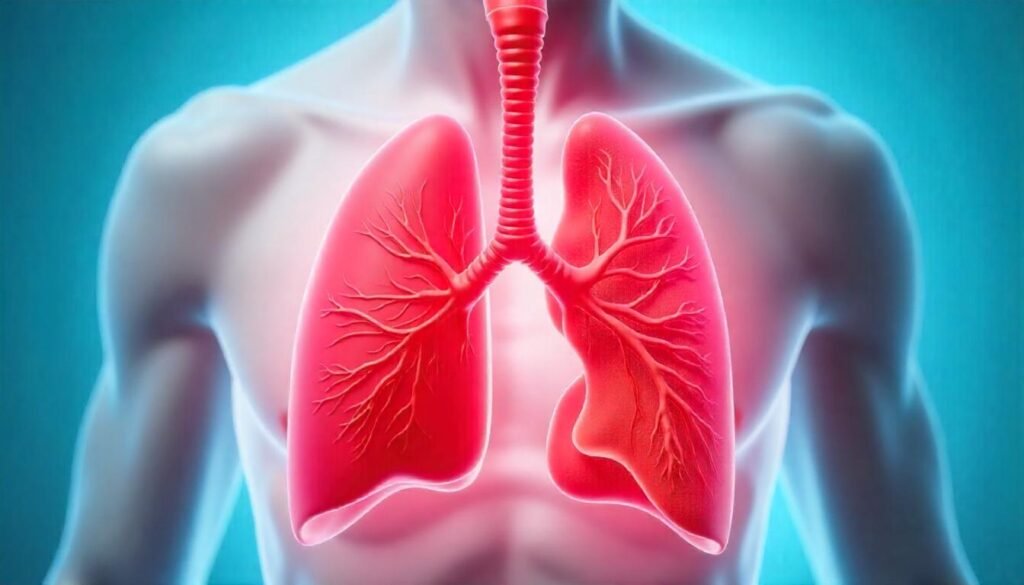This article examines the cystic fibrosis symptoms. Cystic fibrosis (CF) is a genetic disorder that has a profound impact on the respiratory and digestive systems of individuals. This condition arises from mutations in the CFTR gene, which leads to the production of thick and sticky mucus that can obstruct airways and hinder digestive processes.
Table of Contents
Because of its complexity, cystic fibrosis requires early Cystic Fibrosis diagnosis as well as ongoing and comprehensive management strategies to enhance the quality of life for those who are affected by this challenging condition. For individuals with CF, regular medical care and support from healthcare professionals are crucial aspects of maintaining health.

The purpose of this article is to provide readers with a detailed and thorough overview of the various cystic fibrosis symptoms associated with cystic fibrosis. By doing so, we aim to equip readers with the knowledge needed to better understand this condition and to recognize its signs, which is essential for timely medical intervention and effective management.
Understanding these cystic fibrosis symptoms not only aids in awareness but can also help in the navigation of treatment options and support systems that are available for those living with cystic fibrosis.
What is Cystic Fibrosis?
Cystic Fibrosis causes by mutations in the CFTR gene, which leads to the production of thick and sticky mucus in various organs, particularly the lungs and pancreas. This mucus can obstruct airways and hinder digestive functions, resulting in a range of cystic fibrosis symptoms that can vary in severity.
Common Cystic Fibrosis Symptoms
Grasping the various cystic fibrosis symptoms of cystic fibrosis is extremely important for prompt identification and effective management of the condition. Recognizing these signs early can lead to better treatment outcomes and enhanced quality of life for those affected. Below are some of the most frequently observed symptoms that are commonly linked to this genetic disorder:
1. Respiratory Cystic Fibrosis Symptoms
- Chronic Cough: One of the most prominent and recognizable cystic fibrosis symptoms associated with cystic fibrosis is a persistent cough. This cough is often characterized by the production of mucus, which can vary in consistency and amount. It may present as a dry cough, where little to no mucus is expelled, or as a productive cough, which involves the expulsion of mucus from the lungs. Over time, this chronic cough can become more severe, leading to increased discomfort and potential disruptions in daily activities.
- Wheezing and Shortness of Breath: In addition to the cough, individuals suffering from cystic fibrosis may also experience wheezing sounds while breathing. This wheezing can be particularly pronounced during physical exertion or exercise, making it difficult for individuals to engage in activities that require increased respiratory effort. Alongside wheezing, episodes of shortness of breath may occur, further complicating the individual’s ability to breathe comfortably, especially during times of heightened physical activity or exertion.
- Frequent Lung Infections: Another significant concern for people with cystic fibrosis is their heightened susceptibility to lung infections. Due to the underlying issues with mucus clearance in the lungs, these individuals are at an increased risk of developing infections that can exacerbate their condition. If these infections are not addressed and treated promptly, they can lead to more serious complications, further impacting lung function and overall health. Regular monitoring and timely medical intervention are essential to manage these risks effectively.

2. Digestive Cystic Fibrosis Symptoms
- Children who have cystic fibrosis often experience significant challenges related to poor growth and weight gain. This issue arises primarily due to the malabsorption of essential nutrients, which prevents these children from gaining weight and growing at the rate that is typical for their age group. As a result, their overall physical development may be hindered, impacting their health and well-being.
- Additionally, cystic fibrosis can lead to frequent and greasy stools, which are a direct consequence of the body’s inability to effectively digest food. These stools are often characterized by an oily texture and a foul smell, making them unpleasant and difficult to flush away. This condition can be quite distressing for children and may serve as an indicator of their digestive struggles.
- In more severe cases, the thick mucus that accumulates in the intestines can lead to intestinal blockages. These blockages can cause intense and severe abdominal pain, along with significant discomfort. Such complications can create additional challenges for affected individuals, both in their daily activities and in terms of their overall health. These gastrointestinal issues highlight the complex nature of managing cystic fibrosis in children.

3. Other Cystic Fibrosis Symptoms
- Salty Skin: Many parents frequently observe an interesting phenomenon when they kiss their child; the skin often has a noticeably salty taste. This distinct saltiness is primarily Cystic Fibrosis causes by an excessive loss of salt that occurs through the body’s sweat during physical activities or in warmer temperatures. Parents may find this unusual, as it serves as a clear indication of the underlying condition affecting their child’s body and its ability to regulate salt levels.
- Reproductive Issues: The impact of cystic fibrosis extends beyond just respiratory complications; it can also lead to significant reproductive challenges. For men diagnosed with this condition, infertility is a common concern due to blockages and other issues in the reproductive system. Women, on the other hand, may experience various complications if they become pregnant, potentially affecting both their health and the health of the fetus. The complexities introduced by cystic fibrosis can thus create serious hurdles in reproductive health, highlighting the importance of medical support and intervention.

Recognizing Cystic Fibrosis Symptoms Early
Early recognition of cystic fibrosis symptoms is vital for effective management. If you or someone you know experiences a combination of the cystic fibrosis symptoms mentioned above, it is essential to consult a healthcare professional for further evaluation.
Cystic Fibrosis diagnosis
Diagnosing cystic fibrosis typically involves a combination of tests, including:
- Newborn Screening: In the United States, a majority of states implement newborn screening tests specifically designed to detect cystic fibrosis. These screening tests are important because they can identify the presence of elevated levels of immunoreactive trypsinogen, often abbreviated as IRT, found in the blood of infants shortly after birth. This initial test serves as a crucial first step in identifying potential cases of cystic fibrosis early on.
- Sweat Test: Another critical diagnostic procedure is the sweat test, which is conducted to measure the concentration of salt present in an individual’s sweat. In individuals with cystic fibrosis, the levels of chloride in sweat are typically higher than normal. Therefore, an elevated level of chloride can indicate the presence of cystic fibrosis, making this test an essential tool in the diagnostic process.
- Genetic Testing: Additionally, genetic testing plays a significant role in confirming a diagnosis of cystic fibrosis. This blood test is specifically designed to detect mutations that may occur in the CFTR gene, which is responsible for the condition. By identifying these mutations, healthcare providers can confirm whether an individual has cystic fibrosis, thus helping guide appropriate treatment and management strategies for those affected by this genetic disorder.

Management and Treatment
While there is currently no cure for cystic fibrosis, various treatments can manage cystic fibrosis symptoms effectively:
- Medications: In managing respiratory conditions, medications play a crucial role and may include various types of treatments. Mucolytics are often prescribed to help thin and loosen mucus, making it easier for patients to expel it from their lungs. Additionally, antibiotics may be necessary to combat bacterial lung infections, ensuring that any infections are effectively treated and the patient’s respiratory health is preserved. Furthermore, enzyme supplements can be beneficial in facilitating digestion, particularly for those who may struggle with nutrient absorption due to underlying health issues.
- Physical Therapy: Another important aspect of treatment involves physical therapy, specifically chest physiotherapy, which is designed to help clear mucus from the lungs. This form of therapy can significantly improve respiratory function by promoting effective clearing techniques and enhancing lung capacity. Through regular sessions, individuals are guided on how to perform exercises and techniques that help mobilize mucus and improve airflow, leading to better overall respiratory health.
- Nutritional Support: In addition to medication and physical therapy, proper nutritional support is essential for maintaining overall health. A high-calorie diet that is supplemented with necessary vitamins and minerals can assist individuals in achieving and sustaining a healthy weight. This nutritional approach is vital, especially for those who may have difficulty maintaining weight due to their condition. By ensuring that the body receives adequate nutrition, individuals can support their overall health and optimize their well-being, contributing to improved energy levels and resilience against illness.

Living with Cystic Fibrosis
Living with cystic fibrosis requires ongoing care and support. Regular follow-ups with healthcare providers, adherence to treatment plans, and lifestyle adjustments can significantly enhance the quality of life for those affected.
Conclusion
Cystic fibrosis is a complex condition that presents a range of cystic fibrosis symptoms affecting the respiratory and digestive systems. Early detection and intervention are crucial for managing the disease effectively. If you suspect that you or someone you know may have cystic fibrosis, seeking medical advice is imperative.
Frequently Asked Questions (FAQs)
1. What are the early signs of cystic fibrosis?
Some of the initial indicators to watch for may consist of a continual cough that does not seem to improve, skin that has an unusually salty texture, and challenges related to gaining an adequate amount of weight. These early signs can be important to recognize for assessment and early intervention.
2. How is cystic fibrosis diagnosed?
The process of diagnosis usually consists of several key components, including newborn screening, which is often performed shortly after birth. In addition to this important initial assessment, healthcare professionals typically conduct sweat tests that measure the concentration of salt in the sweat to help identify certain conditions. Furthermore, genetic testing is often employed to provide a more comprehensive understanding of any underlying genetic disorders that may be present.
3. Can cystic fibrosis be cured?
At present, there is no definitive cure available for cystic fibrosis, a condition that affects the lungs and digestive system. However, it is important to note that there are various effective management strategies and treatments that can significantly enhance the quality of life for those living with this condition. These approaches can help individuals manage their cystic fibrosis symptoms more effectively and lead a healthier, more fulfilling life despite the challenges posed by cystic fibrosis.
4. What is the life expectancy for someone with cystic fibrosis?
Recent advancements in various treatment options have led to a significant increase in life expectancy for many individuals. As a result of these medical breakthroughs, a growing number of people are now able to live well into their 30s, as well as beyond that age, which marks a notable improvement in the quality and length of life for those affected.
5. How can I support someone with cystic fibrosis?
Offering emotional support to individuals, assisting them in adhering to their treatment plans, and promoting the adoption of a healthy lifestyle can collectively lead to a substantial and meaningful impact on their overall well-being and recovery journey. These efforts can truly make a significant difference in their lives.
In summary, understanding cystic fibrosis symptoms and the importance of early diagnosis can lead to better management and improved outcomes for those affected by this challenging condition.


